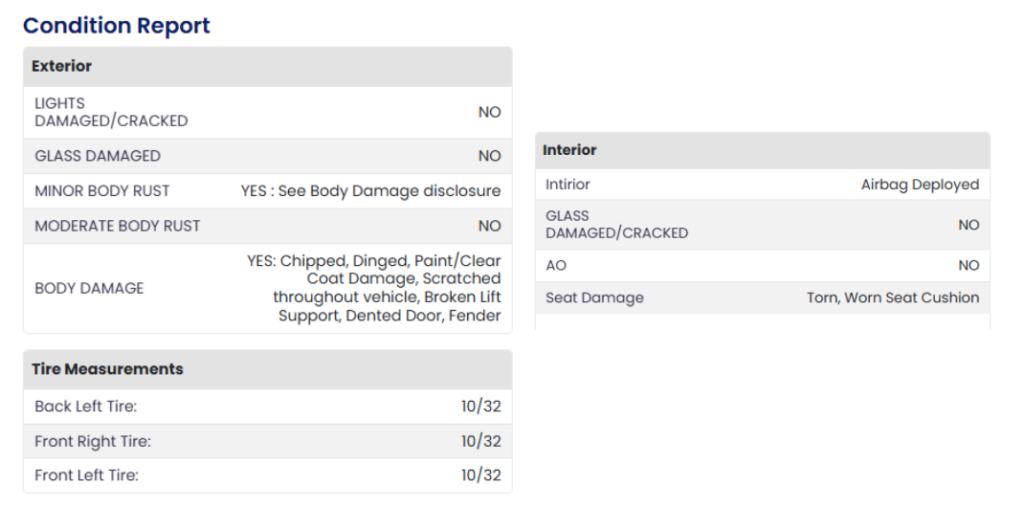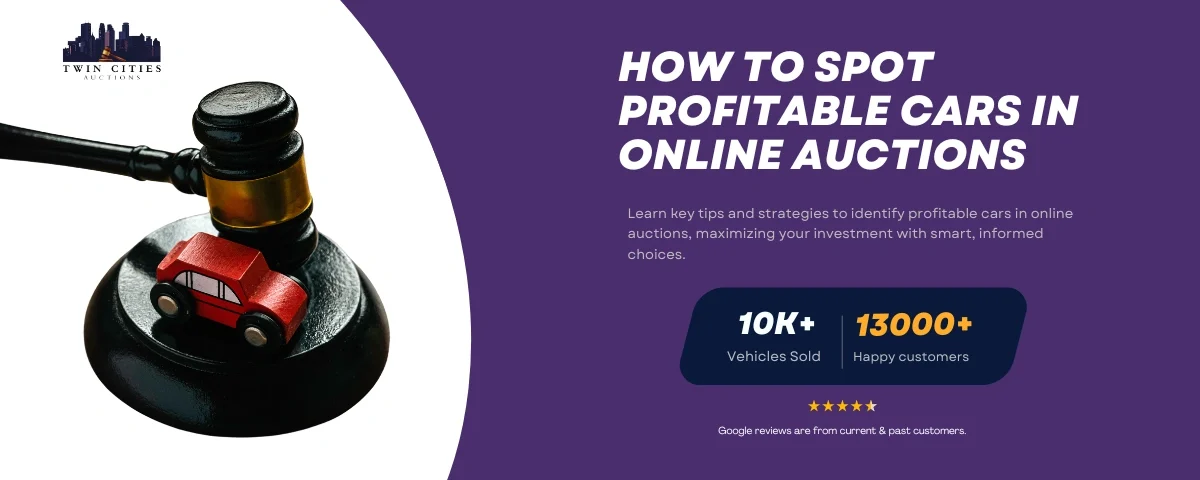Did you know that in 2023, over 9 million vehicles were sold through online auctions in the United States alone?
This booming market presents a golden opportunity for savvy buyers to find profitable vehicles. But how do you separate the gems from the lemons in the vast sea of online listings?
Key Takeaways:
- Research is crucial: Know the market value and potential repair costs before bidding
- Utilize vehicle history reports to uncover hidden issues
- Pay attention to auction dynamics and timing for better deals
- Look for cars with high demand and low supply in your local market
- Always factor in additional costs like transportation and repairs
Understanding Online Car Auctions
Unlike traditional auctions, online car auctions make the process convenient, allowing you to browse, bid, and purchase cars from the comfort of your home.
Online car auctions like Twin Cities Auctions offer a wide range of vehicles, from slightly used models to salvage titles.
The convenience of online auctions comes with its own set of challenges. You can’t physically inspect the car or take it for a test drive.
This makes it crucial to develop a keen eye for spotting profitable opportunities while avoiding potential money pits.
Research is Your Best Friend
Before placing a winning bid on auction cars, thorough research is crucial for those looking to buy cars and turn a profit.
1. Market Value Assessment
To assess market value, start by checking the Kelley Blue Book (KBB) value of the used car you’re interested in, which provides a baseline for its worth in good condition.
Remember, while auction vehicles often sell for less than retail, you must factor in potential repair costs and auction fees when setting your budget.
A good strategy for flipping cars and maximizing your profits is to aim for cars at auction priced at least 20-30% below their market value.
This approach applies to various auction types, including public auctions, and is essential for developing effective bidding strategies.
Thoroughly researching before entering the bidding process, increases your chances of finding a good price on a vehicle at auction and potentially buying cars at auction that will yield substantial profits on auction cars.
2. Vehicle History and Condition
Always check the vehicle history report. Services like Carfax or AutoCheck can reveal crucial information about:
- Previous accidents
- Number of owners
- Maintenance records
- Title status (clean, salvage, rebuilt)
Pay close attention to the vehicle’s condition description and available photos. Look for:
- Signs of major damage or rust
- Mismatched paint or body panels
- Worn interiors
- Tire condition


If possible, arrange for a third-party inspection. Many auction sites offer this service for a fee, and it can save you from costly surprises down the road.
Identifying High-Demand, Low-Supply Vehicles
The key to profitability in car flipping is finding vehicles that are in high demand but low supply in your local market. This often means looking beyond the obvious choices.
Popular Models with a Twist
While everyone might be bidding on the latest Toyota Camry, consider looking for:
- Popular models with rare color combinations
- Vehicles with desirable optional features (e.g., premium sound systems, advanced safety packages)
- Low-mileage examples of older, reliable models
Seasonal Opportunities
Timing can play a big role in profitability. For example:
- Convertibles and sports cars often sell for less in winter months
- SUVs and 4×4 vehicles may be cheaper in summer
- Work trucks might be in higher demand during construction season
Reading Auction Dynamics
Understanding how online auctions work can give you a significant advantage in your quest to maximize profit and flip used cars.
When you’re bidding, remember that your top bid should reflect your research and the potential profit margin. The bid price is just one part of the auction process, and there are several important tips to keep in mind before placing a bid.
Timing is Everything
Effective timing and strategic bidding are crucial for success in car auctions. Here are key factors to consider:
Auction Timing Strategies
- Soft Close Feature: Many public auto auctions use a “soft close” system, extending the auction if there’s last-minute bidding.
- Late Bidding: Placing bids in the final seconds can help avoid driving up prices early and potentially secure better deals.
- Starting Low: Auctions typically begin at a lower price point, allowing for strategic entry into the bidding process.
Watch for Patterns
Pay attention to which types of vehicles are consistently selling below market value. This could indicate a temporary oversupply or a shift in market preferences, both of which can present opportunities to purchase vehicles at advantageous prices.
Auctions give you the opportunity to acquire vehicles at lower costs than traditional markets, but it’s essential to thoroughly check the cars for value and condition before you bid.
Always set a budget based on what you’re looking to spend and the potential resale value to ensure you get a great price without overpaying.
The Importance of Small Details
When you’re hunting for profitable cars, it’s often the little things that can make a big difference:
Minor Issues with Easy Fixes
Look for cars with easily fixable problems that are driving down the price. This could include:
- Minor cosmetic damage
- Simple mechanical issues (e.g., needing a new battery or brake pads)
- Missing or outdated documentation
These issues often scare away less experienced buyers, creating opportunities for those who know how to address them cost-effectively.
Mileage Sweet Spots
Cars with slightly higher mileage than average for their age can often be great deals. Many buyers have psychological barriers around certain mileage numbers (e.g., 100,000 miles).
A well-maintained car just over these thresholds can offer excellent value. Learn more about the good mileage for a used car here.
Calculating Total Costs
Remember, the auction price is just the beginning. To accurately assess profitability, you need to factor in:
- Auction fees and buyer’s premiums
- Transportation costs (if the car isn’t local)
- Necessary repairs and reconditioning
- Your time and effort
- Potential marketing and selling costs
A car that seems like a steal can quickly become unprofitable if these additional costs aren’t carefully considered.
Conclusion
Spotting profitable cars in online auctions is part science, part art. It requires diligent research, a good understanding of market dynamics, and the ability to see potential where others might not.
Whether you’re looking to find the best deals on just one car or aiming to resell multiple vehicles, these skills are crucial. You don’t need a dealer license to participate in most online auctions, making it accessible to anyone interested.
Remember, every successful car flipper started somewhere. With practice and patience, you’ll develop an eye for spotting great deals and turning them into profitable sales, regardless of whether you’re buying to keep or to resell.
Public Auctions Made Easy with Twin Cities Auctions
At Twin Cities Auctions, we strive to simplify the public auction process for everyone. You don’t need a dealer license to buy or sell cars here. Our online auctions are designed to be user-friendly and open to the public, ensuring that individuals of all experience levels—from novice buyers to experienced sellers—can participate with ease.
With a focus on transparency and ease of use, we provide all the tools and support you need to confidently participate in the auction process. Start your car buying or selling journey with us today and experience how straightforward and effective our auction system can be!
FAQ
How can I assess a car’s market value before bidding?
Check the Kelley Blue Book (KBB) value and compare prices on sites like AutoTrader or Cars.com for similar vehicles. Aim for cars priced at least 20-30% below their market value to maximize profit potential.
What should I look for in a vehicle history report?
Focus on previous accidents, number of owners, maintenance records, and title status. These details can reveal crucial information about the car’s condition and potential issues.
How can I spot high-demand, low-supply vehicles?
Look for popular models with rare color combinations, desirable optional features, or low-mileage examples of older, reliable models. Also, consider seasonal opportunities, such as buying convertibles in winter.
What additional costs should I factor in when bidding?
Consider auction fees, buyer’s premiums, transportation costs, necessary repairs, reconditioning expenses, and potential marketing and selling costs. These can significantly impact the overall profitability of a vehicle.
Do I need a dealer license for Twin Cities Auctions?
No, many online auctions, including Twin Cities Auctions, are open to the public and don’t require a dealer license.
This makes it accessible for individuals of all experience levels to participate in buying and selling cars.


